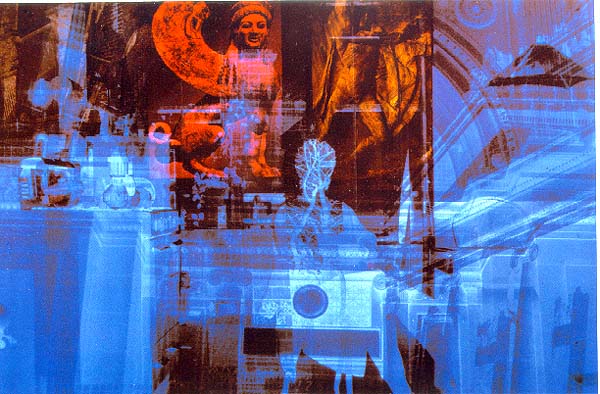
Photo Credit: Albert Lung
By examining the Aristotle's Poetics and his and Plato's philosophic
and scientific views on Time and Space, it is easier to trace our heritage and
appreciate our modern views of ten dimensions in exploding and contracting universes:

Photo Credit: Albert Lung
The beginning of Western civilisation was confined to a very small space, Classical
Greece, in a very specific time, around the fifth century before Christ. And
yet the mind explored such vistas of thought that the foundations were laid
for law, philosophy, rhetoric, science, ethics and dramaturgy. In his book the
Physics, Aristotle (b.384 B.C.) says space is that which is occupied
by matter. Therefore it must be limited and finite. On the other hand, time,
which is defined as a measure of the potentiality of matter, is infinite. Space
has causal powers and things move at one speed or another because of where they
are in space and when they are there.
Read Sophocles' Oedipus Rex, and Homer's The Iliad and The
Odyssey and try to get a better idea of timespace by how the writer structures
events as well as the characters' perceptions of their own time and space. Compare
Aristotle's Physics to his Poetics.
THE POETICS
Drama began from our love and need for imitation, harmony and rhythm. Tragedy is an imitation of characters of noble birth and comedy of inferior types whose flaws are so exaggerated and real that we can laugh at them. Tragedy is an imitation of an action that is serious, complete and of a certain magnitude, in language embellished with each kind of ornament, through pity and fear effecting the proper purgation of the audience's emotions.Pity is aroused by unmerited misfortune; fear by the misfortune of a man like ourselves. Every tragedy must have six parts: Plot, Character, Diction, Thought, Spectacle, Song. Aristotle feels plot is more important than character because the most beautiful colors, laid on cofusedly, will not give as much pleasure as the chalk outline of a portrait. Do you agree? Spectacle is the least important. Diction involves the delivery of words that are either current, or strange, or metaphorical, or ornamental, or newly-coined, or lengthened, or contracted, or altered. The perfection of style is to be clear without being mean or too literal, vulgar, simplistic etc.
Aristotle hated episodic drama: for tragedy to be worthwhile it had to be a well constructed story with a beginning, middle and end that proceeded from action to counteraction by necessity and probability. There is a strong connection between what he wanted from drama and what he wanted from rhetoric, although the purpose of tragedy is to purge the emotions. Tragedy must be simpler and more credible than comedy if it is to move us to tears rather than laugher. A simple plot is one which takes place without reversal or recognition. A complex plot has reversals and recognitions which should arise from the internal structure. The best form of recognition is coincident with reversal, as in OEDIPUS. Characters must be chosen in such a way that their actions raise the stakes of the drama. It's better to have family members kill each other than an enemy kill an enemy because then you can construct scenes that have the elements of betrayal, jealousy, fear, love etc. as well as anger. The DEUS EX MACHINA must only be employed for events external to the drama; the crisis/climax should arise of necessity from the inciting incident, just the way it's supposed to do in Hollywood screenplays. Every tragedy falls into two parts: complication and unravelling. Complication is every action that moves to the turning-point from good to bad fortune and unravelling is that which extends from the beginning of the change to the end.
An epic structure differs from a tragedy because it has a multiplicity of plots. Epic structure is similar to what we call narrative structure. However as poetry (Homer) it was usually written in the heroic measure. Alexander Pope satirized this form in his mock epic poem THE RAPE OF THE LOCK in the eighteenth century. Epic tales can be longer, more complicated, more irrational and fantastical because they are not confined to the stage.